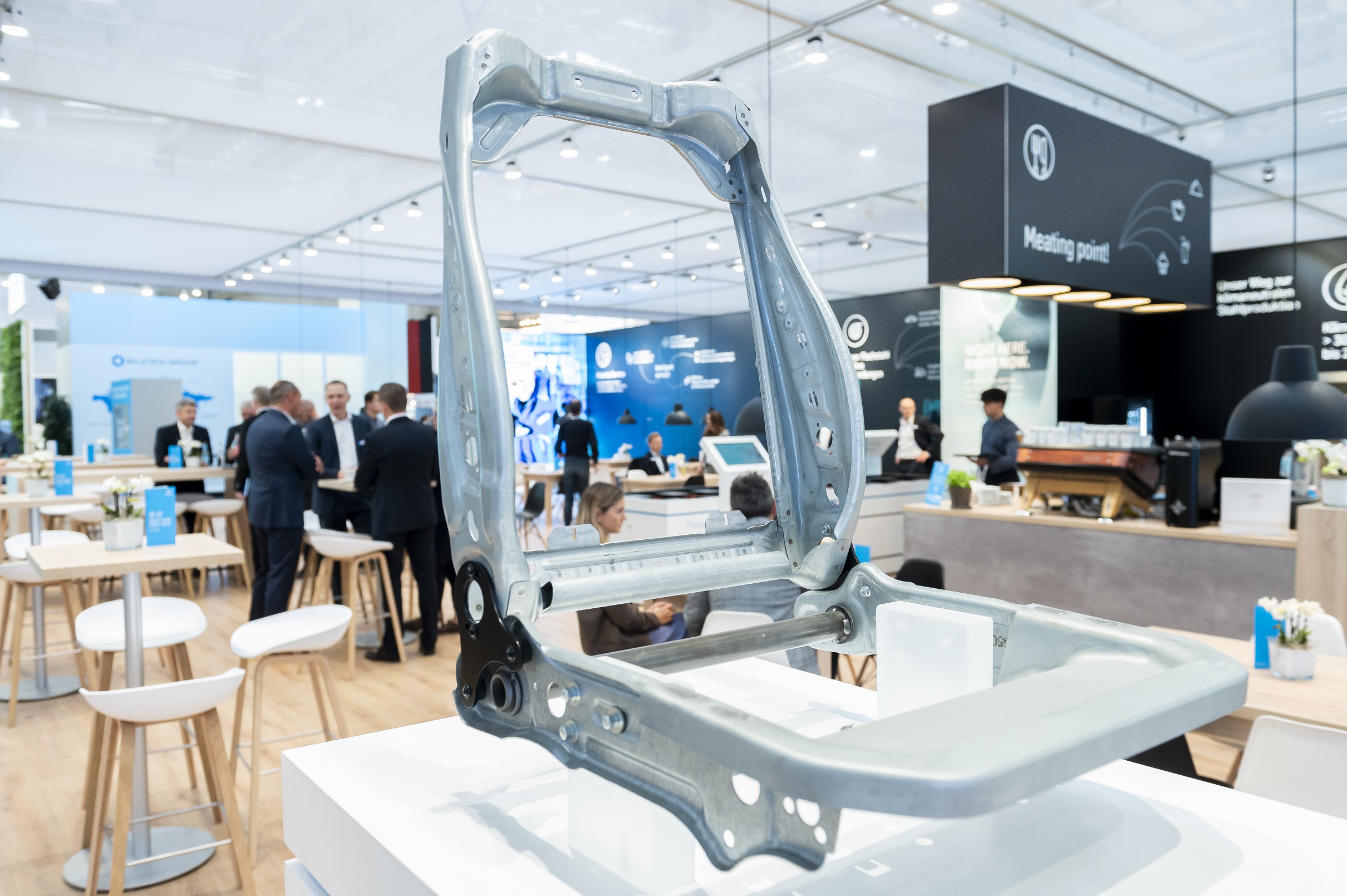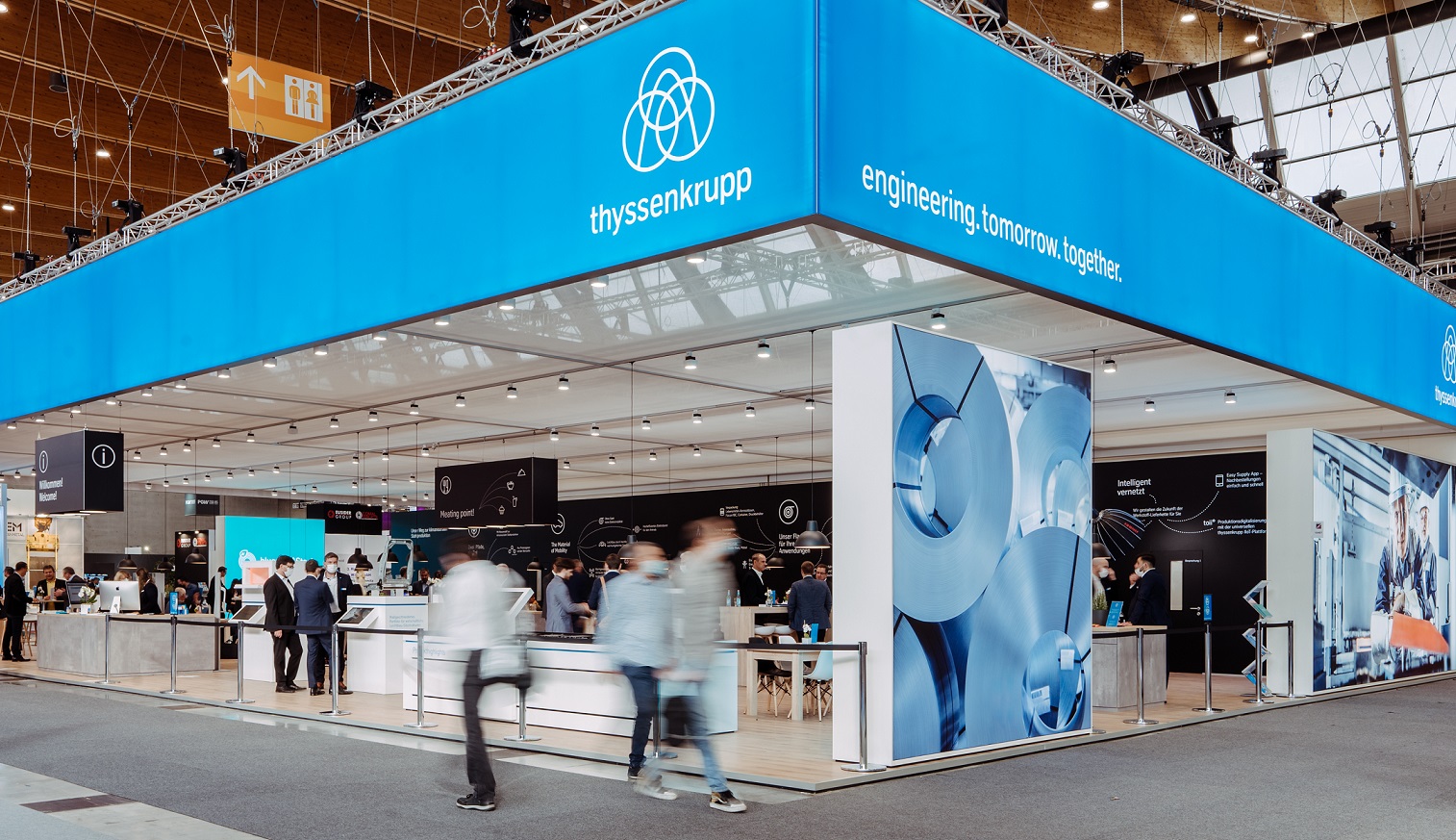
At Blechexpo 2023 in Stuttgart, thyssenkrupp Steel presented its broad “Material of Mobility” portfolio: production-ready special steels that are used for body and chassis parts.
Under the motto “Unlock your green potential”, thyssenkrupp Steel is demonstrating its commitment to the future of mobility and the development of advanced solutions that power both traditional combustion vehicles and electric vehicles.
Innovative AHSS development for e-mobility
In the development of modern Advanced High Strength Steels (AHSS) of the third generation, thyssenkrupp Steel is cooperating closely with the Japanese steel manufacturer JFE Steel Corporation. The latest milestones in the collaboration are the new JetQ 980 and JetQ 1180 grades for geometrically complex body structure components. The two highly ductile steel grades for cold forming support automotive customers with the current challenges of vehicle design – particularly in the field of e-mobility.
The construction of electric vehicles requires materials in the high strength range that can be easily formed. This is exactly what characterizes JetQ: The high elongation at break, the pronounced hole expansion capacity and the strong resistance to edge failure allow more complex component geometries with high stretching and deep-drawing proportions in shaping for the first time. In this way, the JetQ 980 and JetQ 1180 open up new cost-cutting and lightweight construction potential for customers.
New alloy concept minimizes hydrogen-induced cracking
With AS Pro, Thyssenkrupp Steel is the first steel manufacturer in the world to offer a new, pioneering coating for hot forming ultra-high-strength MBW steels on the market – for maximum component safety in cars. It significantly minimizes the process-related hydrogen absorption during the annealing process in hot forming and ensures a more economical production process.
AS Pro is applied to the conveyor belt in the modern hot-dip coating lines at thyssenkrupp Steel. In contrast to the standard AS coating, a specific amount of magnesium is added to the molten bath in addition to aluminum and silicon, which is homogeneously distributed both in the melt and in the coating. With this small change, AS Pro ensures that significantly less diffusible hydrogen is formed during the annealing process, which can penetrate the material. This minimizes the risk of hydrogen-induced cracking. Together with the MBW 1900, which is now ready for series production, AS Pro forms the “optimum combination for maximum performance of hot-formed components” according to the manufacturer.
Hot-rolled lightweight steels with excellent workability
At Blechexpo 2023, thyssenkrupp Steel will also be showcasing an extensive hot-rolled portfolio that is predestined for the economical lightweight construction of high-strength chassis parts. For example, the ultra high-strength hot-rolled multiphase steel CHW 700Y950T is brand new in series production. The chassis quality with a strength of almost 1,000 megapascals and optimized hole expansion offers a significant weight reduction as well as high operational strength for complex chassis parts. The new steel grade also impresses with its good crash behavior, as high yield strength values with reserves in elongation at break ensure high deformation resistance and therefore high crash energy absorption.
The micro-alloyed HD (high ductility) steels Perform 315 HD to 550 HD are now also ready for series production. The steels score points with their uniform property profile and improved elongation at break. Thanks to the improved material properties, the new micro-alloyed HD grades can be used in areas such as axles or wheel suspension.
Economical lightweight steel seat structures
The use of high-strength steels from thyssenkrupp Steel is the best way to meet the modern, diverse requirements of seat components: Modern vehicle seats should be lightweight and crash-proof, take up little space and be cost-effective to produce – without compromising on comfort. From high-ductility, close-tolerance hot-rolled strip and medium-wide strip to cold-rolled, high-strength multiphase steels, customers will find all this in the Thyssenkrupp Steel portfolio – including the best forming and joining properties.
Then there are the potential weight savings: Today, the average car seat weighs around 12.5 kilograms – in terms of the supporting seat structures alone. The front and rear seat structures of a car weigh around 50 kilograms in total. A portfolio of steel grades tailored to the special seat requirements can help to reduce the weight by 15 percent – and completely cost-neutral. Interested customers were able to find out more about this and the new uncoated dual-phase and complex-phase steels with strengths of 800 and 1,000 megapascals at the trade fair stand.
Micro-alloyed fine-grained structural steel
For safety-relevant components in particular, functional and design aspects are playing an increasingly important role alongside reliability, requiring the highest forming capacity of the base material. This is precisely where the two newly developed middle strip grades Precidur HSM 380 and HSM 420HD from thyssenkrupp Hohenlimburg come in. Compared to the company’s proven micro-alloyed fine-grained structural steels, they offer increased forming potential with the same strength.
During the development phase, individual interested customers tested the material. After consistently positive feedback, the company has already switched to series production with the new materials. As they meet all the requirements of the DIN EN 10149 and VDA 239-100 standards, they can easily replace the previous MC variants.
Electrical steel for highly efficient drives
When it comes to the high performance and energy efficiency of drive motors for electric vehicles, the trend is towards high-quality and particularly thin products with a high silicon content, such as those offered by thyssenkrupp Steel under the brand name Powercore Traction. Two brand new electrical steel grades from the Powercore Traction product family are in the final stages of development and will soon be added to thyssenkrupp Steel’s product range. At just 0.25 millimetres, the particularly thin NO25 electrical steel strips have excellent magnetic properties and high mechanical strength, according to the manufacturer. The new developments from thyssenkrupp Steel are also characterized by very low remagnetization losses of 12.5 watts per kilogram or 13 watts per kilogram. This has improved them by up to 11 percent compared to current reference grades.




